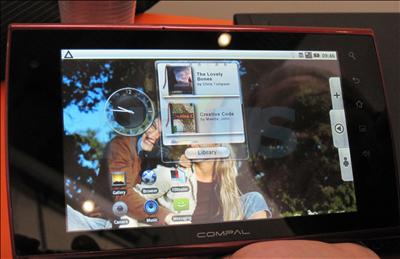Playing the field
This is made possible by near field communication, a technology NXP Semiconductors develops. We spoke to Steve Owen, marketing VP at NXP, and he stressed: "The prime area is security - everything else follows on from that."
NXP is the company behind the Oyster system, and Owen thinks it has been a great demonstration of the usage model for end-users. As well as embedding one of its chips in a phone, NFC could also be used in a micro SD card for standalone secure applications and TV remote controls for shopping from your armchair.
Owen expects to see phones using NFC technology to start hitting the market towards the end of this year.
Back at ARM, Mobile segment boss Bob Morris was again keen to extol the virtues of ARM's Mali graphics core, announcing that Samsung has licensed the technology to use in its future SoCs.
Demonstrating an even-handed approach, however, Morris was also showing-off a Compal tablet running NVIDIA's Tegra 2 - which, of course, doesn't contain a Mali core - and some of the graphically intensive things it can do.















